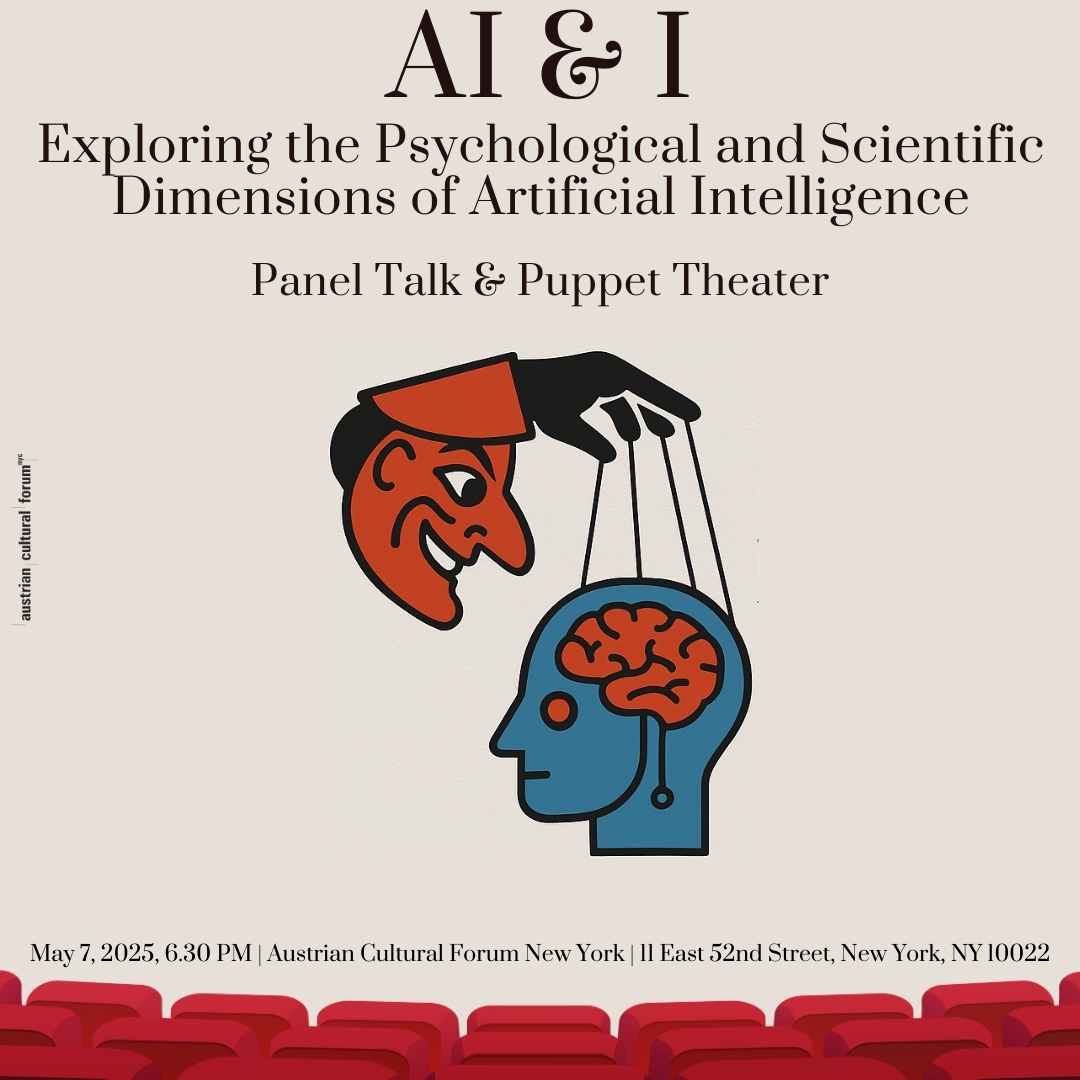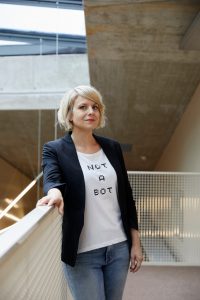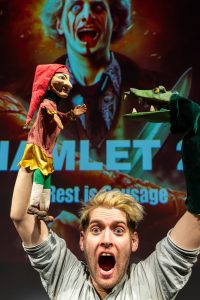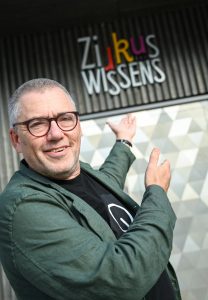
AI & I – Exploring the Psychological & Scientific Dimensions of AI
Image: ACFNY
MAY 7 | 6:30 PM
TICKETS AVAILABLE HERE
Join us at the Austrian Cultural Forum New York (ACFNY) for AI & I, a thought-provoking event examining artificial intelligence from psychological, scientific, and artistic perspectives. AI & I is a cooperation between the Circus of Knowledge of Johannes Kepler University Linz and the Austrian Cultural Forum New York.
About the Event
The evening begins with a 40-minute artistic intervention: The anarchic puppet show “A.I. – A Punch Intervenes”, which playfully reimagines AI through the character of Punch as a bot. Following the performance by Andreas Pfaffenberger, a panel discussion will feature Professor Martina Mara and Professor Marc Streit of Johannes Kepler University Linz (JKU), and Professor Katharina Pistor of Columbia Law School. The talk will be moderated by Airan Berg, Artistic Director of the Circus of Knowledge—a theater dedicated to connecting the arts and sciences.
Martina Mara, Professor of Psychology of AI & Robotics at JKU Linz, will explore the psychological implications of anthropomorphizing AI. Why do we attribute emotions and intentions to conversational AI, and what risks does this pose for trust and decision-making? Her talk will highlight research from the Robopsychology Lab and innovative approaches to fostering AI literacy.
Marc Streit, Professor of Visual Data Science at JKU Linz, will discuss the critical role of human-AI collaboration in scientific discovery. From drug research to AI-driven analytics and explainable AI, his presentation will showcase how visualization tools empower researchers to interpret complex models and maintain human oversight in AI-powered advancements.
Katharina Pistor, Professor of Comparative Law at Columbia Law School, will examine the hidden power structures embedded in global capitalism. Her research reveals how law — often crafted behind closed doors — transforms assets like debt or financial products into capital, enabling the accumulation and protection of private wealth. Drawing from her acclaimed book The Code of Capital, she will explore how legal coding fuels inequality and shapes the modern economy.
Don’t miss this engaging fusion of science, psychology, and art as we navigate the evolving landscape of AI!
Additional Information on Participants and Content
 Martina Mara | Talk Title: “Is this a person speaking? Psychological implications of simulated humanness in conversational AI”
Martina Mara | Talk Title: “Is this a person speaking? Psychological implications of simulated humanness in conversational AI”
Martina Mara is a leading expert on the psychology of artificial intelligence and robotics. She is a Professor at Johannes Kepler University Linz and heads the Robopsychology Lab at the Linz Institute of Technology. Her research explores how humans interact with AI systems and robots, focusing on trust, anthropomorphism, and ethical implications. Before joining academia, she worked in the private sector, including at Ars Electronica Futurelab, leading international tech collaborations. She holds a PhD in Psychology and received her habilitation in 2022. Mara has won multiple awards, including the Vienna Women’s Prize and the Käthe Leichter Prize. She is a co-founder of the Initiative Digitalisierung Chancengerecht and a regular contributor to science communication through lectures, exhibitions, and media. Image: Paul Kranzler
 Katharina Pistor: is a leading scholar on capitalism, finance, and law. She is the Edwin B. Parker Professor of Comparative Law at Columbia Law School and has held positions at Harvard, the Max Planck Institute, and the London School of Economics. Her book The Code of Capital (2019) explores how legal coding shapes wealth and inequality and was named one of the best books of the year by the Financial Times and Business Insider. She has two forthcoming books: Capitalist Law and How to Transform It and Coded Power. An elected member of the Berlin-Brandenburg Academy of Sciences, she has received the Max Planck Research Award and contributes regularly to Project Syndicate, The Guardian, and The New York Times. Image: Barbara Alper
Katharina Pistor: is a leading scholar on capitalism, finance, and law. She is the Edwin B. Parker Professor of Comparative Law at Columbia Law School and has held positions at Harvard, the Max Planck Institute, and the London School of Economics. Her book The Code of Capital (2019) explores how legal coding shapes wealth and inequality and was named one of the best books of the year by the Financial Times and Business Insider. She has two forthcoming books: Capitalist Law and How to Transform It and Coded Power. An elected member of the Berlin-Brandenburg Academy of Sciences, she has received the Max Planck Research Award and contributes regularly to Project Syndicate, The Guardian, and The New York Times. Image: Barbara Alper
 Marc Streit | Talk Title: Human-AI Collaboration in Scientific Discovery
Marc Streit | Talk Title: Human-AI Collaboration in Scientific Discovery
Marc Streit is a professor of Computer Science at Johannes Kepler University Linz, where he leads the Visual Data Science Lab. His research focuses on the intersection of human-centered computing, data visualization, and artificial intelligence. He develops interactive tools that help scientists interpret complex data and AI models in fields such as biomedicine, drug discovery, and cheminformatics. A recipient of several awards, including the EuroVis Young Researcher Award, he has held visiting positions at Harvard and the Broad Institute. Streit is a co-founder of Datavisyn, a spin-off specializing in visual analytics solutions. He is passionate about fostering human-AI collaboration to drive scientific discovery and emphasizes the importance of humans making informed decisions in AI-driven environments. Image: Marc Streit
 Artistic Intervention | A.I. – A Punch Intervenes
Artistic Intervention | A.I. – A Punch Intervenes
An anarchic puppet show for adults featuring “Puppetficial” intelligence. Performance by Andreas Pfaffenberger.
Is artificial intelligence truly “intelligent”? Can a non-living machine become conscious? Or are these merely our projections? Could something “artificially” created begin to think, become creative, or develop imagination? Most importantly—how? A presentation about AI escalates when an unexpected figure intervenes: Punch. Just like a chatbot, Punch is not actually alive, yet we are all too willing to believe he is a living, conscious being. Neither chatbot nor Punch cares whether what they say is true or false. For both, human categories such as truth or meaning are irrelevant—they simply generate output. Punch, like a chatbot, speaks anarchically and wildly, with little or no regard for logic or consistency. Whether Puppetficial or Artificial Intelligence, in the end, it is up to us to decide how we engage with the content they produce. Image: Nick Mangafas
 The Circus of Knowledge at Johannes Kepler University Linz
The Circus of Knowledge at Johannes Kepler University Linz
The Circus connects art and science, builds trust in scientific knowledge, creates original productions for all ages, and offers workshops with artists and scientists. It collaborates with schools and civil society, promotes international cooperation, and fosters an inclusive and interdisciplinary environment. By encouraging collaboration between traditionally distinct disciplines, the Circus of Knowledge sparks creativity and innovation. It serves as a catalyst for research projects that bridge the arts and sciences and enriches learning through a holistic understanding of complex topics. Beyond scientific literacy, the Circus emphasizes essential soft skills and public engagement.
Short bio: Airan Berg is an artistic director and theater maker with extensive experience in both institutional and independent settings. He specializes in large-scale, participatory, and inclusive projects that connect the arts and sciences. He is currently Director of the Circus of Knowledge at Johannes Kepler University Linz, which transforms complex scientific topics into accessible, playful experiences. Berg was the Artistic Director for Performing Arts of Linz 2009, the European Capital of Culture. In this role, he co-created Klangwolke09 and I Like to Movie It, Move It!, a creativity and learning project in 100 schools. He also led Urban Inquiries for Austria’s National Theatre and co-developed Orfeo & Majnun, an intercultural music theater project staged in seven European cities. In Australia, he directed Floods of Fire, a two-day festival involving over 1,500 citizens, three universities, a symphony orchestra, and a citizens’ orchestra. Image: JKU

